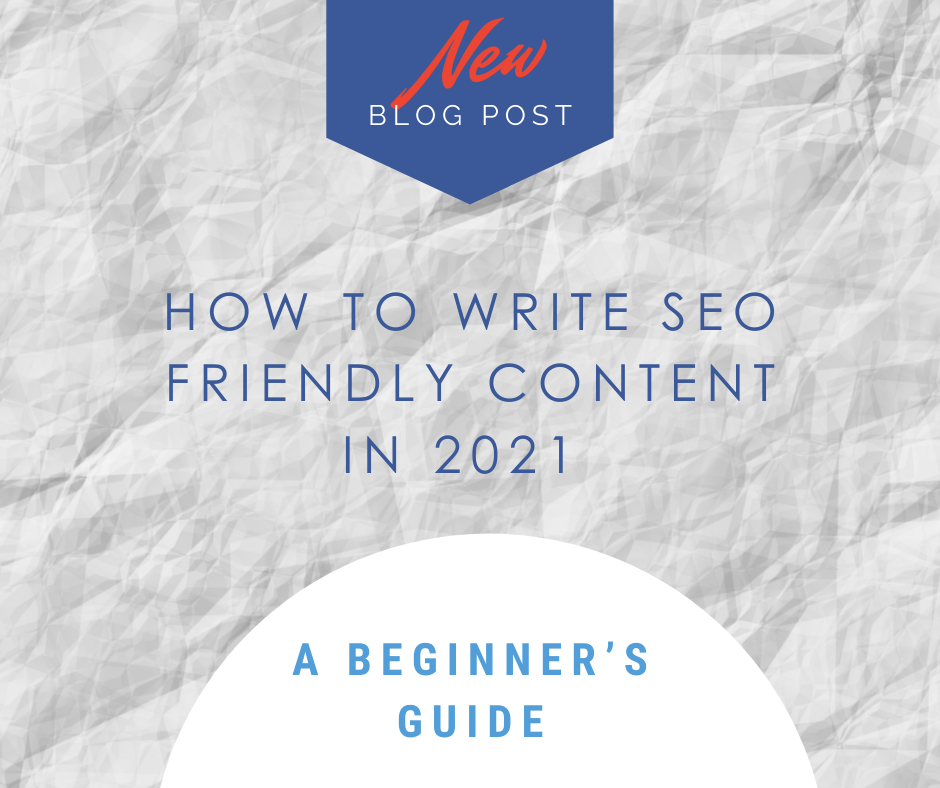Are you a small business new to SEO and uncertain about what it all means? Don’t worry, because this beginner friendly guide will give you five tips to write great content for your small business’s blog
What is SEO?
We know that sometimes, all of the terms used in online marketing can be confusing. But there are some that are more important than others. Search Engine Optimization (SEO) is one of those that will help grow your small business the most.
Early on in your business’s online journey, you probably want to find effective and affordable methods to improve your site traffic without adding much stress to your daily workload.
SEO allows search engines, like Google, Yahoo, or Bing, to find the content on your website easily and provide it to those who want that content the most; your future customers!
Why is Knowing SEO Important?
If you don’t really know what you’re doing, SEO can be daunting and seem like an insurmountable task.
“I need to do what, with what tool?”
But really, writing SEO friendly content is all about writing user friendly content. If you look at a page and don’t really understand what you’re looking at, it’s easy to just click away and go onto the next thing.
What SEO ultimately does is bring in more organic traffic to your website. Organic traffic is, in other words, people that come to your blog straight from a search engine results page.
This is good because it means there is a direct link in their mind between what they wanted (when they searched for it) and what they have found on your site.
5 Things To Keep in Mind for SEO Friendly Content
So here we have five key things you should do when writing SEO friendly content in 2021 when starting out.
1. Understand Your Keywords
Any time you read about SEO, you’re going to hear about keywords. These are words or phrases that readers are searching for when they use a search engine.
This tip is to not only know what a keyword is, but it’s to understand what keywords are important for your business.
A roofing contractor isn’t going to want to use keywords like “best online marketing tools”, because that doesn’t make sense for them. They might, however, want to use something like “top roofing materials in 2021”.
When th inking about the keywords for your web and blog content, you need to put yourself in the mind of your readers. What search terms are they using to find you? What questions do they need answering?
inking about the keywords for your web and blog content, you need to put yourself in the mind of your readers. What search terms are they using to find you? What questions do they need answering?
Using a tool like Google Keyword Planner is a great idea.
2. Optimize Your Title
Once you’ve realized what keywords your readers and customers are going to be using, it’s time to think of a title that will make it easy to find your amazing content.
Titles should utilize the keywords you have identified in the first step.
A great title has two goals:
- allow the search engines to find and index it easily, and,
- allow the reader to understand what the page is about at a glance.
If we take the title of this blog post as an example, “How to Write SEO Friendly Content in 2021 — A Beginner’s Guide”, you’ll see that not only are we incorporating our keywords, but it’s also clear what the blog post is going to be about.
Your title is not only the thing that is at the top of your blog post, but it’s the first thing a search engine sees when it looks at your website, so it’s pretty important!
3. Use Your Headers Properly
The next step in writing your blog posts is to use the proper HTML tags for headers. Depending exactly how you write your blog content, you’ll have a couple of different options for dealing with headers.
First of all, make sure you use them! Headers are important for readers because they draw the eye to specific places on the page. They make your content easier to read.
Secondly, make sure that when you add the header into your page that they’re wrapped in [h1], [h2], etc. tags. These tags are part of your webpages’ hidden code, and if you use something like WordPress, you can easily make headers.
Importantly, the number beside the H is telling Google how important that header is. Your title will be H1, subtitles for sections should be H2, smaller paragraph headings H3, and so on…
4. Write Great Content
So, enough about the structure of your blog. The next tip in our guide is probably a little obvious, but let me explain what this means.
Writing great content for your blog sounds like a no-brainer, but how useful and how well-written the content is does impact on your SEO. Google’s algorithms can determine how the content on your site is written, and well-written engaging content floats to the top.
Great content engages with your audience’s needs. That’s about it. This means that you need to consider not only how you’re selling your business, but also how you’re communicating your business’s ideas to your target audience.
This means that your blog shouldn’t be post after post of “sale now on!” posts, but should also include articles that talk about where you source your materials, news in your industry, and other relevant topics that your audience will love.
5. Keep Content Fresh and Timely
The final tip in our guide to SEO friendly content is to keep writing great content on a consistent basis and keep it up to date.
Fresh content is new content, not recycled articles that you’ve posted before. No one wants to see the same thing posted again and again on a blog, that’s what adverts are for instead.
Blog content should engage your audience. We have said that a few times, but engage simply means to not bore them. The same content time after time will bore your readers.
To Recap Our SEO Friendly Content Guide
So, our 5 tips for writing SEO friendly content are:
- Understand your keywords
- Optimize your titles
- Use headers properly
- Write great content
- Keep content fresh and up to date
These five things will help give your small business’s blog a boost at the beginning of your SEO and online marketing journey. But they are only the beginning! There is so much more you could try to learn.
There are options available for you if you’re uncertain whether you can learn all of this yourself, though. Small businesses are often run on small staffs and you don’t always have time to learn five new skills!
Would you like us to write your content for you? Contact us today!


